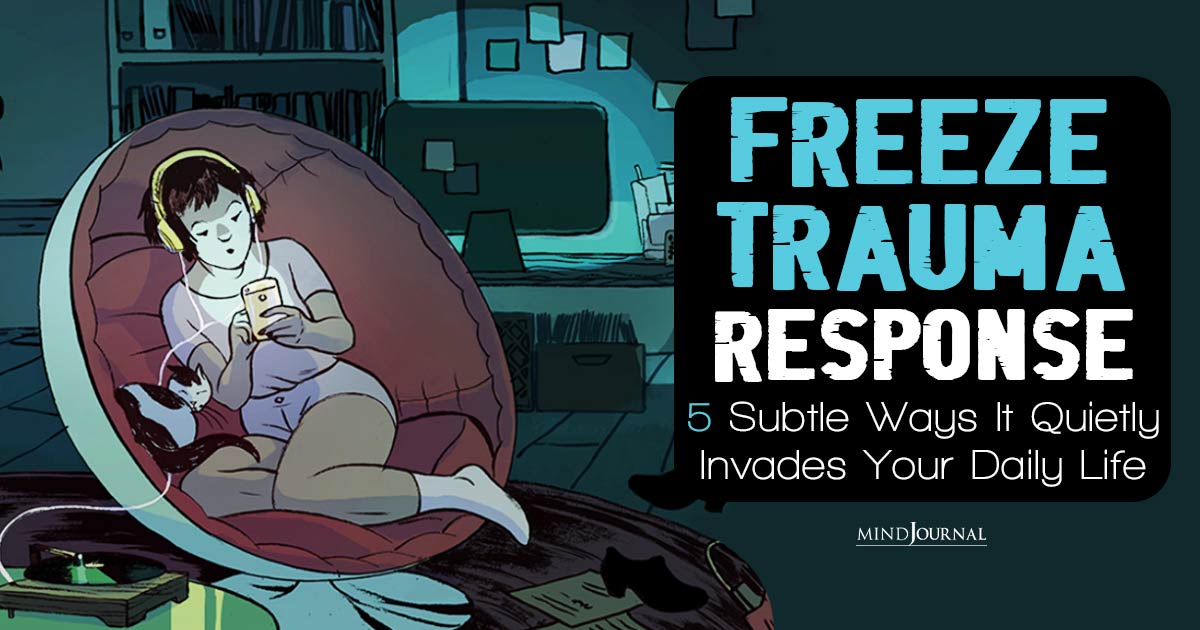Have you ever wondered, why it is hard to get out of bed sometimes? Is it a lack of motivation or what? Well, let’s take a look at some freeze trauma response examples to reveal what is behind this experience.
What Is Freeze Trauma Exactly?
Liz Tenuto, “The Workout Witch,” with 1 million followers, recently explained in a viral TikTok video with 1.6 million views that feeling stuck in daily activities such as getting out of bed or going out could be due to chronic freeze trauma response.
This simple, yet complicated explanation struck a chord with viewers revealing common challenges.
There are three responses to stress: fight, flight or freeze and the freeze response is one of them. This is a protective mechanism that involves becoming immobile. It decreases heart rate and muscle tone. Psychology and trauma therapy see it as crucial.

We all know what it feels like when you can’t stand up from your bed or the towel after taking a shower; it seems as if you can’t come to grips with the reality of having to face the day. All the freeze trauma response symptoms could be going on under your feet and you wouldn’t know.
Related: Fight, Flight, Freeze: The Pitfalls of Empathy as a Please Response
5 Freeze Trauma Response Symptoms At Play:
1. Bedtime Battles:
Wondering why is so hard to get out of bed? Well, finding it harder and harder to leave the warm confines of your bed in the morning even if you were sleeping all night through, freeze trauma response could be what’s causing that.
This could manifest as an overall sense of tiredness or an overpowering need to remain wrapped in warm bedding.
2. Post-Shower Standstill:
Have you ever sat for a long time on a towel after bathing without dressing up because you are lost in thoughts, unmotivated or drained?
This is one of the freeze trauma examples and it may indicate that your body is actually responding to stress which makes it hard for you to move from one task to another for a momentary period.
3. Difficulty Making Decisions:
In addition, freeze trauma response symptoms it can also affect decision making. A freeze response caused by stress might explain why we often get stuck before food selection or choosing what cloth to wear.
4. Excessive Procrastination:
Freeze trauma response often goes hand-in-hand with procrastination. Avoidance activities like putting off tasks especially those outside your comfort zone are some ways how our bodies try and protect us from perceived danger by maintaining familiar atmosphere.
5. Social Withdrawal:
Another aspect of freeze trauma response includes isolation. Such feelings may cause increasing reluctance concerning social interactions or preference for being alone which serves as self-preservation from future sources of anxiety.
How to Deal with Freeze Trauma Response Symptoms?
1. Acknowledge and Validate Your Feelings:
One of the first steps to dealing with freeze trauma response is admitting its presence. Recognize that the response of your body is normal when stressed, but not a reflection of inadequacy or laziness.
2. Deep breaths and mindfulness:
Start by engaging in deep breathing exercises to calm down your nervous system. Your body knows that it’s safe when you take long breaths, which can help reduce the freeze response.
Regular mindfulness practices like yoga or meditation in your daily routine can bring peace into your life.
3. Create a daily schedule:
One way to control the symptoms of this condition is to develop a routine that includes some time for yourself and activities you love.
To avoid freezing trauma responses caused by unfamiliarity, it is important to create a predictable timeline.
4. Break big tasks into manageable ones
Don’t take on too many things that are difficult at once. Start with small steps towards building back your self-confidence once more.
Also, it will enable you to see the little successes along the way. By breaking large tasks into smaller manageable ones, you can slowly prepare yourself for bigger challenges.
5. Seeking support:
Can you imagine the relief that comes with sharing your experiences or seeking support?
Listening to other people’s opinions and ways of dealing with everyday challenges can be a source of enlightenment. As an example, a person could have a conversation with someone they trust or get something off their chest to somebody who listens carefully.
Related: 4 Trauma Responses: When Your Defense Mechanism Turns Toxic
Freezing trauma responses require self-love and resilience. Do not expect to get your life back right away. Healing does not happen overnight. Till then share your thoughts in the comments below!










Leave a Reply